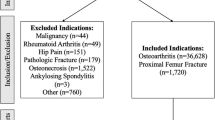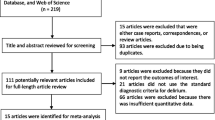Abstract
Delirium is a major adverse postoperative event in elderly patients. Incidence rates of postoperative delirium are difficult to determine. Because of the accuracy, brevity, and ease of use by clinical interviewers, the Confusion Assessment Method (CAM) has become widely used. This study used the CAM to determine the rate of postoperative delirium in patients undergoing total hip arthroplasty (THA) and total knee arthroplasty (TKA) procedures under regional anesthesia. Following Institutional Review Board approval, a prospective study of 20 patients per group ages 70 and above undergoing unilateral THA or TKA was initiated. Both groups received a combined spinal–epidural, postoperative patient-controlled epidural anesthesia, and postoperative oral opioids. Patient interviews occurred five times: once preoperatively and two times each on postoperative days 1 and 2. Only two patients were assessed as delirious according to the CAM method (one in each group; 5%). Patient assessment by other clinicians indicated that five additional patients experienced acute change in mental status; however, these patients were not delirious at the times of the study interviews. The rate of delirium in the elderly after arthroplasty performed under regional anesthesia is very low. Reasons for this include patient selection criteria and anesthesia type. The study excluded patients with several proposed risk factors for postoperative delirium: prior history of dementia, history of mental illness, and use of benzodiazepines. The use of regional anesthesia may have also reduced the occurrence of postoperative delirium.
Similar content being viewed by others
References
Bruera E, Bush SH, Willey J, Paraskevopoulos T, Li Z, Palmer JL, Cohen MZ, Sivesind D, Elsayem A. Impact of delirium and recall on the level of distress in patients with advanced cancer and their family caregivers. Cancer 2009;115:2004–12
Ely EW. Delirium in mechanically ventilated patients; validity and reliability of the Confusion Assessment Method for the intensive care unit (CAM-ICU). JAMA. 2001;286:2703–10
Folstein MF, Folstein SE, McHugh PR. “Mini-mental state”. A practical method for grading the cognitive state of patients for the clinician. J Psychiatr Res 1975;12(3):189–98
Inouye SK. The Confusion Assessment Method (CAM): Training Manual and Coding Guide. 2003; New Haven: Yale University School of Medicine.
Inouye SK, Van Dyck CH, Alessi CA, Balkin S, Siegal AP, Horwitz RI. Clarifying confusion: The Confusion Assessment Method. A New method for detection of delirium. Ann Intern Med 1990:113:941–8
Kalisvaart KJ, Vreeswijk R, de Jonghe JFM, van der Ploeg T, van Gool WA, Eikelenboom P. Risk factors and prediction of postoperative delirium in elderly hip-surgery patients: implementation and validation of a medical risk factor model. J Am Geriat Soc 2006;54:817–22
Kudoh A, Takse H, Takahira Y, Takazawa T. Postoperative confusion increases in elderly long-term benzodiazepine users. Anesth Anal 2004;99:1674–8
Lewis LM, Miller DK, Morley JE, Nork MJ, Lasater LC. Unrecognized delirium in ED geriatric patients. AM J Emerg Med. 1995;13:142–5
Lynch EP, Lazor MA, Gellis JE, Orav J, Goldman L, Marcantonio ER. The impact of postoperative pain on the development of postoperative delirium. Anesth Analg 1998;86:781–5
Marcantonio ER, Michaels M, Resnick NM. Diagnosing delirium by telephone. J Gen Intern Med. 1998;13:621–3
Mason SE, Noel-Storr A, Ritchie CW. The impact of general and regional anesthesia on the incidence of post-operative cognitive dysfunction and post-operative delirium: a systematic review with meta-analysis. J Alzheimers Dis 2010;22 Suppl 3:67–79
Morrison RS, Chassin MR, Siu AL. The medical consultant’s role in caring for patients with hip fracture. Ann Intern Med 1998;128:1010–20
Ramaiah R, Lam AR. Postoperative Cognitive Dysfunction in the Elderly. Anesthesiology Clin 2009;27:485–96
Tombaugh TN, McIntyre NJ. The mini-mental state examination: a comprehensive review. J Am Geriatr Soc 1992;40(9):922–35
Williams-Russo P, Urquhart B, Sharrock N, Charlson M. Postoperative delirium: predictors and prognosis in elderly orthopedic patients. J Am Geriatr Soc 1992;40:759–67
YaDeau JT, Cahill JB, Zawadsky MW, Sharrock NE, Bottner F, Morelli CM, Kahn RL, Sculco TP. The effects of femoral nerve blockade in conjunction with epidural analgesia after total knee arthroplasty. Anesth Analg 2005;101:891–5
Author information
Authors and Affiliations
Corresponding author
Additional information
Each author certifies that he or she has no commercial associations (e.g., consultancies, stock ownership, equity interest, patent/licensing arrangements, etc.) that might pose a conflict of interest in connection with the submitted article.
Each author certifies that his or her institution has approved the reporting of these cases, that all investigations were conducted in conformity with ethical principles of research, and that informed consent for participating in the study was obtained.
This study was conducted with approval from the Institutional Review Board of the Hospital for Special Surgery. Work was performed at the Hospital for Special Surgery. All funding was provided by the Department of Anesthesiology, Hospital for Special Surgery.
Level of Evidence: Diagnostic study, level III
Rights and permissions
About this article
Cite this article
Rade, M.C., YaDeau, J.T., Ford, C. et al. Postoperative Delirium in Elderly Patients After Elective Hip or Knee Arthroplasty Performed Under Regional Anesthesia. HSS Jrnl 7, 151–156 (2011). https://doi.org/10.1007/s11420-011-9195-2
Received:
Accepted:
Published:
Issue Date:
DOI: https://doi.org/10.1007/s11420-011-9195-2




